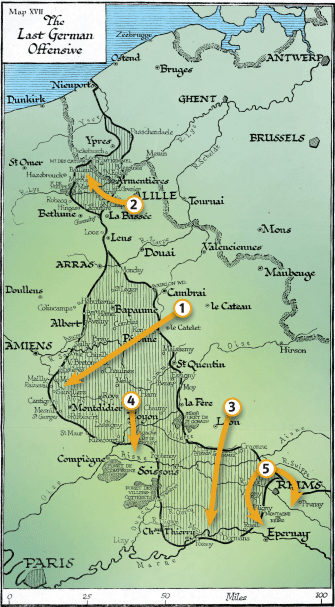The Ludendorff Offensive was a German offensive launched in March 1918, which was supposed to be the final offensive of the war in hopes that it would defeat the British Forces and drive France to seek armistice with Germany. However, this ultimately failed as Germany failed to capitalise on its gains during the start of this attack and was forced to retreat back and eventually surrender. The offensive holds historical significance due to its role in causing the downfall of Germany in World War One, as their loss and the following conditions caused by the numerous treaties they signed can be argued to have contributed to the outbreak of World War Two. However, this attack also holds significance as it credits the style of attrition warfare: Germany was unable to capitalise on its territorial gains at the beginning of the offensive due to its lack of resources and manpower, especially in the face of the United States who had joined the allies with much more resources and men. This threat of the US pushed them to attack, but it crumbled due to the overwhelming possession of resources on the opposing side and acts like Britain’s naval blockade which weakened the country over time. It did finally show that continuous attack on the enemy could be the way to victory, which was the concept upon which the nature of WW1 was founded.

Military map of the different parts of the Spring Offensive
Edith Cavill was a British nurse living in Belgium at the outbreak of World War I and, after the German occupation of Belgium, started sheltering British and other Allied soldiers before smuggling them through a network over to the neutral country of the Netherlands as well as transferring information. Eventually, German officials grew suspicious of her and, after uncovering what she had been doing, executed her by firing squad in 1915. Cavill is significant for her contribution to the resistance movement against Germany during World War I as she shows the way even normal citizens were dedicated to the war effort during the first months of the conflict. Her story is also important for its impact: after her execution, Britain used her story for anti-German propaganda in other Allied states and portrayed her as a martyr who died at the hands of the cruel and brutal German government.

Photo of Edith Cavill, photographer unknown